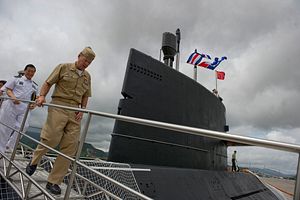On July 15, Thailand’s defense minister Prawit Wongsuwan said that Thailand has put a hold on its newly announced billion-dollar plan to purchase three submarines from China, threatening to once again defer the country’s dream of acquiring a capability it has lacked for more than six decades.
According to Xinhua, Prawit said that the navy’s submarine purchasing plan would “not be submitted to the cabinet for the time being pending thorough study.” His comments come just weeks after the Thai navy confirmed that it had selected Chinese submarines over others from Germany, South Korea, Sweden and Russia to give Bangkok its first submarine capability since 1951 (See: “How Did China Just Win Thailand’s New Submarine Bid?”).
For those who are well-acquainted with Thailand’s record on attempted submarine purchases, this looks all too familiar. As I have pointed out repeatedly, Thailand has tried since the 1990s to ink submarine deals with several countries – including most recently Germany and South Korea – but cost issues and internal differences have previously complicated and derailed plans (See: “Thailand Eyes Submarine Fleet”). Thailand’s past experience with submarines suggests that any renewed efforts in this direction ought to be viewed with caution.
The decision to place a hold on this particular submarine deal — which would cost Thailand 36 billion baht ($1.06 billion) for three Chinese submarines — is also not altogether unexpected. The purchase has run into fierce opposition within Thailand among politicians and activists, many of whom have raised doubts about whether the country really needs submarines and suggested that the money would be better spent on more urgent priorities like boosting the economy. Given all this, it is not surprising that Prawit referenced the need to take into account “the public reception” to the submarine purchasing plan. While he was not specific on how this would be done, his suggestion that the navy is “yet to conduct a thorough study” on how suitable and cost-effective the submarines are – which directly contradicts his earlier statement that Chinese submarines were clearly the most cost-effective – indicates that this may require not only more time, but further examination.
Yet much more could be at work beyond just financial considerations. There has also been fierce domestic and international resentment over Thailand’s decision to hand 109 Uighurs to Chinese authorities, as The Diplomat reported last week. The Uighur incident and the submarine deal have fed into a broader concern that Thailand’s generals are moving too close to China, with worrying implications for domestic politics and foreign policy. Indeed, a high-ranking navy source close to the project told The Bangkok Post that it was deferred partly over criticism of Thailand and China about the handling of 109 Uighurs to Chinese authorities. According to that source, the navy and the ministry decided not to include the plan for cabinet approval as expected on Tuesday because they were worried that anger among Thai activists and the public about the Uighur issue could spill over and derail the plan.
It remains to be seen how Thailand will proceed on its submarine deal. The government may choose to eventually move forward on it after opposition has eased or it has ‘raised awareness’ among the public as Prawit has suggested. After all, the deal still enjoys strong support among key decision makers despite these setbacks, including Prime Minister Prayuth Chan-o-cha. But there is also a chance that this may lead Thailand to rethink the wisdom of the purchase more generally. The selection of Chinese submarines was surprising even to seasoned observers, especially given the significance of the purchase, the Thai military’s preference for Western equipment which was also on offer, and well-known suspicions about the reliability of submarines from Beijing (See: “Will Thailand Realize its Submarine Quest?”). Indeed, some had dismissed the selection merely as Bangkok’s way of thumbing its nose at the United States, doubting that the purchase itself would eventually go through. If that is so, past may yet again prove to be prologue in Thailand’s long-deferred dream of acquiring submarines.

































